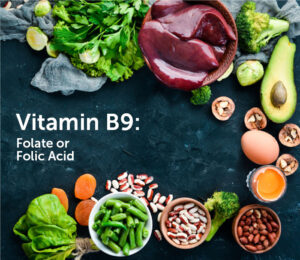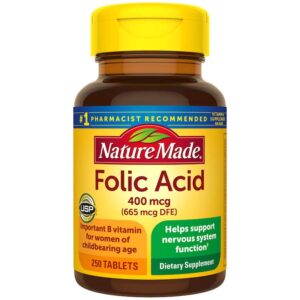What You Need to Know About Folate (Vitamin B9)
Folate, also known as vitamin B9, is the next most important B vitamin to pay attention to after vitamin B12. The synthesis of DNA requires folate; without it, your body can’t make new cells and tissues. It participates in the metabolism of several amino acids, and it also works as a teammate with B12 to help produce healthy red blood cells.
For your body to produce new cells, each cell must be equipped with a copy of the parent cell’s DNA, which requires folate in order to copy the DNA. Since red blood cells and white blood cells divide more rapidly than other cells in your body, they are most vulnerable to folate deficiency. This means deficiencies in folate could lead to anemia and/or a compromised immune system.
Research suggests that a chronic deficiency of folate could elevate the risks of cervical cancer, breast cancer, colon cancer, and pancreatic cancer.

Your body also needs folate for another important function, one that protects your cardiovascular system. Your body naturally makes homocysteine, an amino acid required for making several essential proteins. However, if your body makes too much homocysteine, it can damage the lining of arteries and increase blood clotting. Folate converts excess homocysteine to methionine, another required amino acid that doesn’t damage your arteries.
Folate is the most likely vitamin to interact with drugs. Research has shown that many drugs—including antacids, aspirin and oral contraceptives—interfere with the body’s use of folate. If you take any medication on a regular basis, you also need to monitor your folate intake.
Symptoms of folate deficiency include:
- Fatigue
- Depression
- Mental confusion
- Headaches
- Frequent Colds
- Irritability
- Mouth sores and ulcers
Folate also plays a critical role in preventing the devastating birth defects known as neural tube defects. Neural tube defects range from slight problems in the spine to intellectual disability, severely diminished brain size, and even death shortly after birth. Neural tube defects occur in the first days or weeks of pregnancy, long before most women suspect they are pregnant.
Most young women don’t eat enough fruits and vegetables daily to supply even half the folate needed to prevent a neural tube defect. In the late 1990s, the FDA ordered all enriched grain products such as bread, cereal, rice, and pasta sold in the United States to be fortified with an absorbable synthetic form of folate, folic acid. During the same period, prevalence of low serum folate concentrations for women of childbearing age dropped from 21% to less than 1%, and incidence of neural tube defect dropped by 25%.
Those of us who don’t eat grains need to make sure we get enough folate from foods or possibly a folic acid supplement. The name folate is derived from the word foliage. And true to its name, folate hangs out in leafy green vegetables like spinach and turnip greens.
Some of the best sources of folate include:
- Beef & Chicken Liver (the best source)
- Leafy Greens
- Asparagus
- Avocados
- Pastured Eggs
- Beats
- Fresh, uncooked vegetables and fruits, which provide more folate than the cooked versions because the heat of cooking destroys much of the folate in foods.
If you’re concerned about getting enough folate, you might want to consider a daily folic acid supplement of about 400 mcg. Folic acid is the synthetic form of folate that your body converts to a useable form.
The USDA recommends women of childbearing age and pregnant women supplement with 400 – 600 mcg of folate per day. Following this recommendation will go a long way in promoting healthy growth of a fetus and newborn.
If you experience any or a combination of the symptoms mentioned above, consider looking at your levels of Folate and B12. Your doctor can test for both. Remember, drugs or medications can affect folate more than any other vitamin. If you get plenty of folate-rich foods and you experience symptoms of folate deficiency, talk to your doctor about folate, or a B-Complex vitamin.
Stay Strong,
Bo Railey


